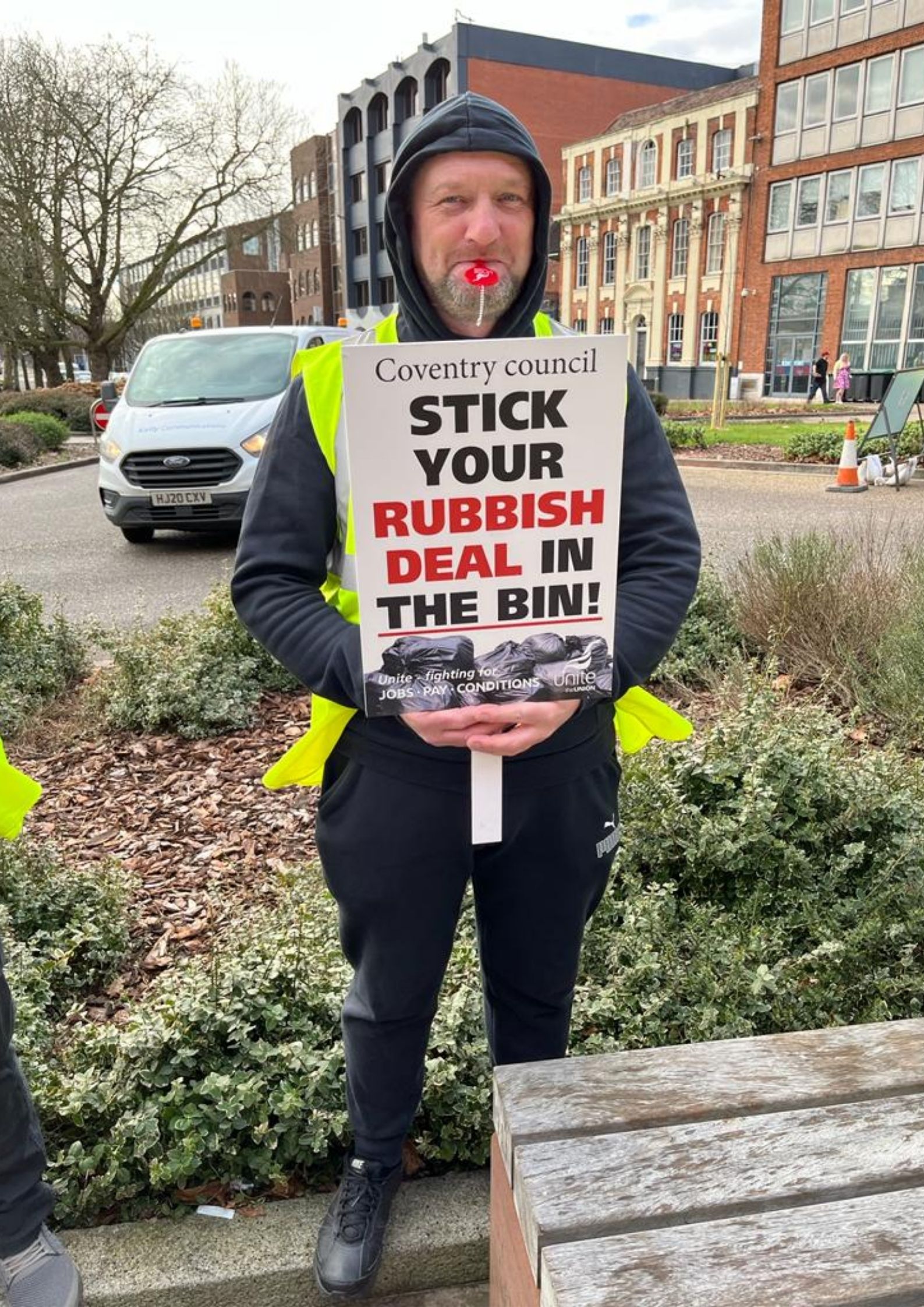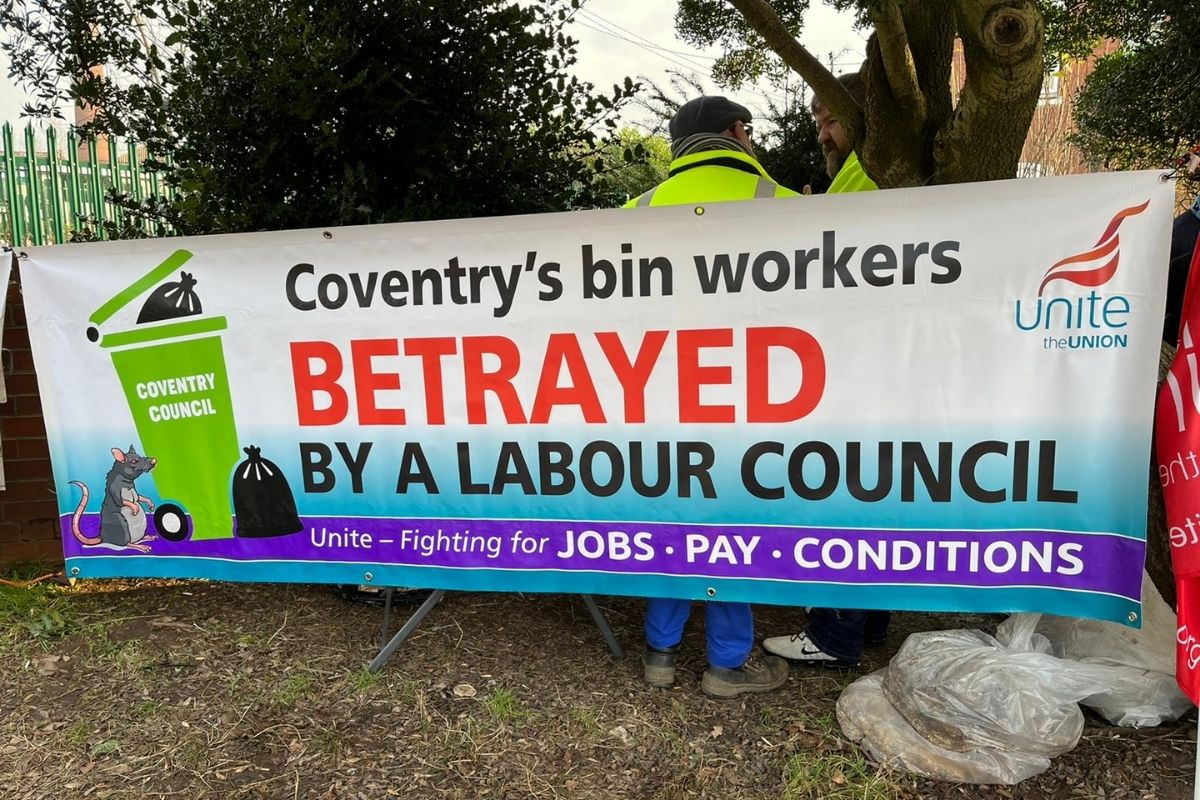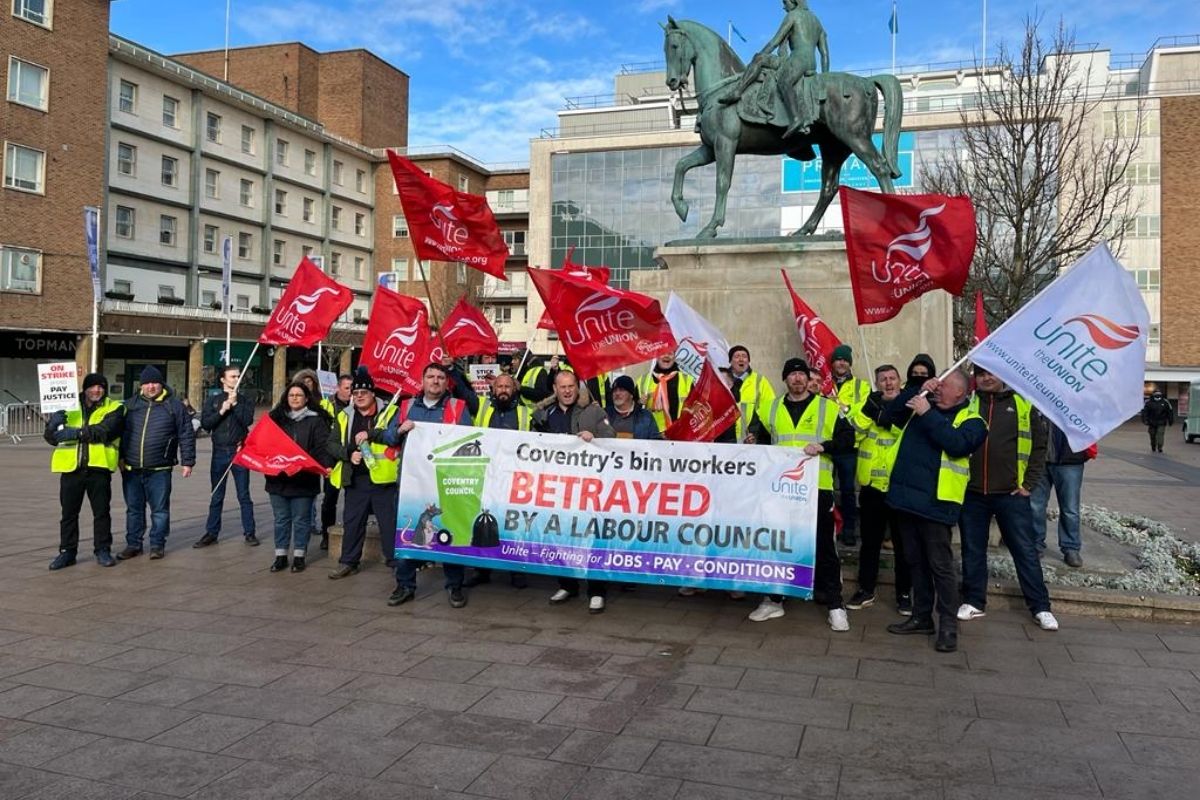Refuse workers at Labour-controlled Coventry city council are continuing their strike for decent pay. The employers, meanwhile, are stepping up their scandalous strike-breaking attempts. We say: Support the strikers! Victory to the workers!
Refuse collection drivers employed by Coventry city council are now nearing the end of their fifth week of strike action. From 31 January, the bin workers moved from striking on selected days to conducting an all-out strike.
The mood on the picket line has hardened, and the strikers are determined to win – despite the scandalous actions and behaviour of the council.
Scabbing
Council bosses are now openly recruiting workers to break the strike. A few years ago, the council bought a privately-owned bulk bin collection company called Tom White Waste Ltd. (TWW) – a company that was notoriously anti-trade union, and whose workers were on inferior terms, conditions, and wages to those employed directly by the council.
Now Coventry city council is hiring drivers on temporary contracts through TWW, and is also trying to get refuse carriers – who take waste bins to the lorries – to work with the scab drivers, in an open attempt to break the strike.
On the picket line this week, it was revealed that the Labour-controlled council has so far spent £1.8 million trying to break the strike. And if the strike continues until late March, the costs could be around £3-4 million.
At the same time, the costs of settling the dispute – by offering the refuse collection drivers a decent wage – would only be around £250,000.
Anger

The council has hit some problems in its strike-breaking attempts, however.
The newly-hired drivers may have HGV qualifications, but they don’t know how to operate the waste lorries.
Last week, for example, one of the scab drivers got to the tip with a full load, but could not empty the lorry as he could not operate the controls. A supervisor without HGV qualifications had to go to the tip to instruct the scab driver.
On another occasion, a scab driver had to reverse down a narrow street, which would not have been any problem for the usual drivers. In doing so, they badly damaged a parked car.
In addition, many of the carriers themselves are angry about the way that they are being treated.
For example, they have been told not only to go out and pick up the bins, but also to pick up side waste in plastic bags. Yet, under a 1999 agreement, they were not to touch side waste, as the contents of the bags could not be verified, with recorded accidents involving broken bottles and used syringes.
Furthermore, if the carriers are to pick up side waste, it would take far longer to complete the collection rounds. So either they would have to work overtime, or many households would not have their rubbish collected in the allotted shift. It would be impossible to finish the daily tasks.
Action
With the council increasing its strike-breaking activities, the union has begun to respond. Last week’s formation of a strike committee was the first step.
Each Monday afternoon, the committee meets to plan the week’s actions. This not only includes picketing, but also leafleting the areas where the Labour councillors are due for re-election in the upcoming local elections in May.
Unite has produced 15,000 copies of an excellent leaflet to counter the council’s disinformation.
One of the employers’ claims is that one refuse collection driver had earned more than £52k last year. For that to happen, a driver at the top of the payscale – earning £27,741 after 12 years of service – would have to work a 72-hour week throughout the year. Not only would that be foolish and dangerous, but also illegal!
Tomorrow, Friday 11 February, will see a march of strikers into the city centre from the picketed depot. Left-wing Labour MP Barry Gardiner is expected to attend in support.
Other events are also planned, but are being kept under wraps, so as not to alert Labour councillors.
Repercussions
This strike will have serious repercussions.
Firstly, after it is over, industrial relations will never be the same again; working relationships will be seriously affected.
Secondly, Labour councillors have maintained the fiction that the strike is between the council officers and Unite the Union, and that the councillors therefore cannot get involved.
That stance is breaking down, as more councillors comment on social media – posting solely negative comments towards the striking drivers.
Cuts

This strike has also raised questions about who controls the council. A political leadership is elected in local elections, usually each May; and that political leadership sets the policies that the council will try to pursue.
The council does not have a free hand, however, as its plans are constrained by its income, which is about 40% of the levels it had in 2010.
The Labour council in Coventry decided, along with all other Labour councils, not to fight the cuts in public spending imposed by the Tories and Lib Dems after the 2008 crash.
By refusing to fight the cuts, the only alternative was to slash services and jobs, and to hold down the wages of the council’s workers.
The Labour council has effectively done a Pontius Pilate, stating that it has nothing to do with the dispute, which they say is between the officers and the union. In effect, these Labour councillors have abandoned any political leadership, and are letting the officers run the council – not the elected councillors.
Thirdly, come the May elections there will be many trade unionists across the city who will be asking why they should vote in the elections, and also why they should vote Labour.
If the officers are to run the council, why not abolish local elections and save on councillors’ salaries altogether?! At this moment, the biggest winner in May will be the Abstention Party.
Support
This strike is taking on regional and national proportions. In another local council, Solihull, drivers in the GMB are voting whether to take strike action.
This week, the picket line saw a visit from the Midlands Regional TUC Secretary, Lee Barron. He promised support from trade unions across the region in terms of solidarity and finance.
Unite general secretary Sharon Graham has also stepped in to support the bin workers, threatening that the union could withdraw its financial support to the Labour Party, if Labour councils – such as that in Coventry – continue to attack its members.
Let me be very clear – the remaining financial support of Labour Party is now under review. Your behaviour and mistreatment of our members will not be accepted. It’s time to act like labour, be the party for workers. #CovBinStrike @coventrycc pic.twitter.com/yVZxVSa9IP
— Sharon Graham (@UniteSharon) February 9, 2022
“Your behaviour and mistreatment of our members will not be accepted,” Graham told the council. “It’s time to act like Labour, and be the party for workers.”
At the same time as this strike in Coventry, meanwhile, Unite members in local government are being balloted nationally in response to a measly 1.75% pay offer for the coming financial year. This at a time when inflation is already over 5%, projected to rise to 7.25% in the coming months.
Anger is increasing across the country. As a result, Unite is beginning to form ‘combines’ to organise workers nationally according to sectors. Strikes by bin workers (organised in Unite) in Coventry, Thurrock, and Bexley could therefore set the bar for similar struggles in councils up and down Britain.
Fightback

The gauntlet has been thrown down by Coventry city council – and Unite has picked it up.
Winning this dispute will be a morale boost to workers everywhere, especially council workers who have been made to bear the costs of the crisis of capitalism.
A victory for the Coventry bin workers would set an inspiring example for how to fight back against the cost of living catastrophe that is bearing down on the working class across Britain.
Workers cannot afford to suffer even greater cuts in living standards. Successful strike action will embolden workers: not only to fight for higher wages and against austerity, but also to question this rotten, corrupt system, where workers pay for capitalism’s crises while the rich get richer.






